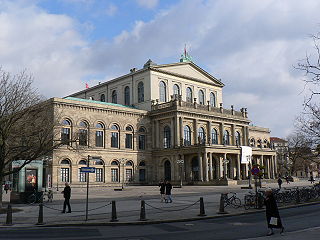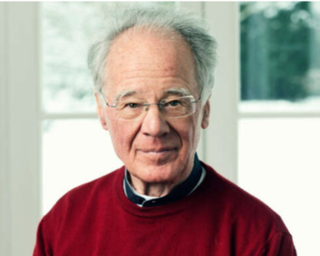
Xaver Paul Thoma (born 5 February 1953) is a German composer of contemporary music, violist and music educator.

Xaver Paul Thoma (born 5 February 1953) is a German composer of contemporary music, violist and music educator.
Thoma was born on 5 February 1953 in the Gasthaus zur Kanone in Haslach im Kinzigtal, the home of the Thoma family of artists. At the age of five, he received a violin and first violin lessons from his grandfather, city music director Karl Thoma (1890–1978). At the age of 12, he started to compose. In 1968, he began his studies at the Musikhochschule in Karlsruhe, with Albert Dietrich violin / viola and chamber music, later with Professor Jörg-Wolfgang Jahn. He studied music theory with Roland Weber and Eugen Werner Velte .
From 1972, he played many great works as a violist in the Badische Staatskapelle Karlsruhe and began to compose intensively. His first works were intended for his fellow musicians. In order to have more time for his compositional work, he resigned from his position in the Badische Staatskapelle in 1977 and began his freelance work as a composer, violist and music teacher. He composed important works such as his first String Quartet (1972/75) or the "Reflexionen Eines Musikalischen Traumas" for large orchestra with solo viola (1979).
In 1980, Thoma moved to Solkau (Lower Saxony). At irregular intervals, he invites to the Loitz Chamber Concerts in his half-timbered farmhouse. For each concert, he also writes a composition for the respective instrumentation. The Loitz concerts soon became a cultural institution beyond the region. A special connection to the Niedersächsische Staatstheater Hannover was established: on the one hand he plays the viola in the orchestra and on the other hand he receives commissions for compositions such as the opera Draußen vor der Tür and the ballet Kafka.
In 1989, the family moved to the Tauber valley (Bad Mergentheim), later Königshofen. This is where the great commissioned works were created. His II. Kammersymphonie was written on the occasion of his composer portrait at the Dresden Centre for Contemporary Music. Since 2001, Thoma has been living and working in Kirchheim unter Teck. Thoma has produced a large number of works.
Thoma was awarded the Lower Saxony Artists' Scholarship in 1983 in recognition of his compositional work. In 1984, he was awarded the Lower Saxony Work Scholarship for writing down the score of the Concerto for Viola and Orchestra op. 34.
Numerous commissions were received from renowned orchestras and institutions. The Staatstheater Hannover commissioned him with several compositions. His main works for several years are the Chamber opera Draußen vor der Tür (premiere Hannover 1994–1995, new production in Leipzig 1995–1998) and KAFKA, the full-length ballet for large orchestra (premiere 1997, choreography by Lothar Höfgen).
In 1993/94, he received several commissions for the 400th anniversary of the Staatstheater Stuttgart. Since the official census of works began in 1972, over 140 compositions have been written, many of them as commissioned works: opera, ballet, chamber music, choral works, song, instrumental concerts, and orchestra works. [1]

From 1972 to 1980, Thoma gave concerts as a viola player in the elective quartet, participated in selection concerts of young artists, various master classes, among others with the Bartók Quartet. After several years of chamber music in various formations, the Quintetto coll'arco developed with former colleagues of the Wahl-Quartet in 1999. With this quintet, among others, a radio production of his string quintet (1998) was produced in the SWR-Studio Karlsruhe. [3]
In 1972, he started his professional career as a viola player in the Badische Staatskapelle Karlsruhe and in later years played as a freelancer in various orchestras, among others in the Lower Saxony State Orchestra Hanover and NDR Hamburg. Since 1977, he has been a member of the Bayreuth Festival and since 1990 of the Stuttgart State Orchestra. Many compositions were written for different instrumentations, for example his Nachtstücke. [4]

Since the time of his studies, intensive teaching activity has been the balance between composing and active music-making. In three decades, he composed pieces for young people, such as:
Christof Prick is a German orchestra conductor. He uses the name Christof Perick in English-speaking countries. His father was the concertmaster of the Hamburg Philharmonic.

Hanover State Opera is a German opera company based in Hanover, the state capital of Lower Saxony. The company is resident in the Hanover Opera House, and is part of a publicly-funded umbrella performing arts organisation called Hanover State Theatre of Lower Saxony, or simply Hanover State Theatre.

Gustaf Allan Pettersson was a Swedish composer and violist. He is considered one of the 20th century's most important Swedish composers and was described as one of the last great symphonists, often compared to Gustav Mahler. His music can hardly be confused with other 20th-century works. In the final decade of his life, his symphonies developed an international following, particularly in Germany and Sweden. Of these, his best known work is Symphony No. 7. His music later found success in the United States. The conductors Antal Doráti and Sergiu Comissiona premiered and recorded several of his symphonies. Pettersson's song cycle Barefoot Songs influenced many of his compositions. Doráti arranged eight of the Barefoot Songs. Birgit Cullberg produced three ballets based on Pettersson's music.

George Alexander Albrecht was a German conductor and composer, who also worked as a musicologist and academic teacher. A prolific composer at a young age, he was Generalmusikdirektor (GMD) of the Staatsoper Hannover from 1965 for 30 years, where he led not only the major operas by Mozart and stageworks by Wagner, but contemporary composers, such as Aribert Reimann's Troades in 1987. He was GMD of the Nationaltheater Weimar from 1996, and taught at the Hochschule für Musik Franz Liszt, Weimar. Albrecht promoted the works of neglected composers such as Wilhelm Furtwängler, Hans Pfitzner, and Erwin Schulhoff.

Volker David Kirchner was a German composer and violist. After studies of violin and composition at the Peter Cornelius Conservatory, the Hochschule für Musik Köln and the Hochschule für Musik Detmold, he worked for decades as a violist in the Radio-Sinfonie-Orchester Frankfurt. He was simultaneously the violist in the Kehr Trio founded by his violin teacher Günter Kehr, and a composer of incidental music at the Hessisches Staatstheater Wiesbaden.
Walter Fedor Georg Abendroth was a German composer, editor, and writer on music.
Paul Leonard Schäffer is a German composer, conductor and pianist.
Leopold Reichwein was a German conductor and composer.
Wolf-Dieter Hauschild was a German conductor, choirmaster, artistic director, composer, harpsichordist and university lecturer.
Otto Reinhold was a German composer and music educator
Wolfgang Marschner was a German violinist, teacher of violin, composer and conductor. He was concertmaster of the WDR Sinfonieorchester Köln, and instrumental in world premieres of contemporary music. He was professor at the Folkwang-Hochschule Essen, the Musikhochschule Köln, the Tokyo University of Fine Arts and Music and, for more than three decades, at the Hochschule für Musik Freiburg. He also taught at the Darmstädter Ferienkurse.
Michael Helmrath is a German oboist and conductor and since the 2016/2017 season, active as General Music Director of the Theater Nordhausen/Loh-Orchester Sondershausen.
Olaf Koch was a German conductor and Hochschullehrer.

The Philharmonische Staatsorchester Halle was a symphony orchestra in Halle that existed from 1946 to 2006, which functioned as a concert orchestra and was last predominantly supported by the Land of Saxony-Anhalt. As a result of the fusion with the Orchester des Opernhauses Halle, the Orchestra was merged into the Staatskapelle Halle in 2006.
Heribert Esser is a German conductor and academic teacher. In 1962–1986, he held the position of director of music at Braunschweig, and the Elder Chair of Music at the Elder Conservatorium of Music of the University of Adelaide, South Australia, from 1987 to 1994. Most recently he conducted the Philharmonisches Staatsorchester Halle.
Alfred Lipka was a German violist.
Peter Aderhold is a German composer and conductor.
Markus Lukas Frank is a German horn player and conductor.
Anthony Bramall is a British conductor.